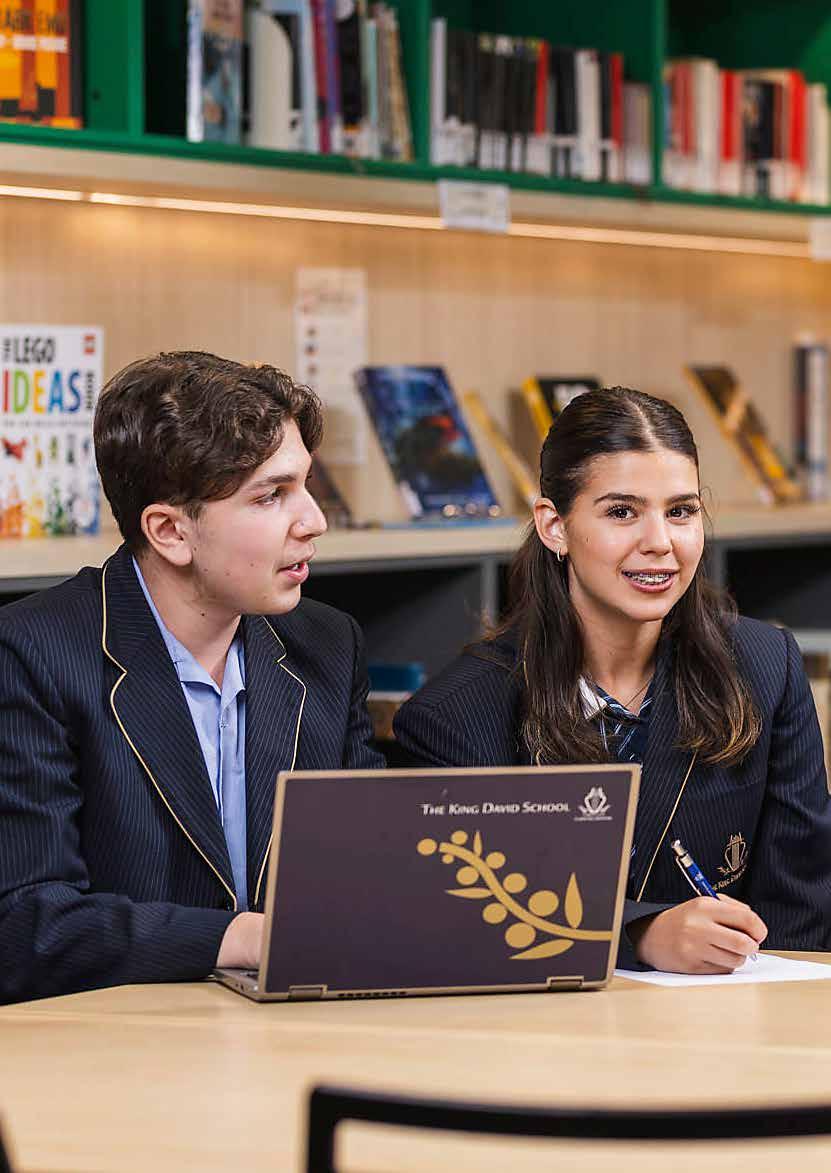

INSPIRATIONS
AUTUMN 2024



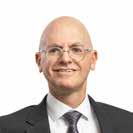
ISCHOOL COUNCIL PRESIDENT
t seems like yesterday that I was at the Back to School service which was hosted by Temple Beth Israel in early February. The service, which was run by our Year 12 cohort, was an amazing event which generated an incredible level of ruach and was enjoyed by all who were lucky enough to be in attendance. Kol HaKavod.
One of underlying themes of our education process at The King David School is academic innovation. This involves the recognition of the need to ensure that our academic programs are presented in a manner which is not only relevant to our students, but which also facilitates their educational journey.
Coincidently, there was a link between the themes from the Back to School Service and the concept of academic innovation. As part of the service, our Year 12 students drew an analogy from Inside Out, a movie which explored how emotions can interact and impact their academic pursuits. Marc Light continued with the movie theme by sharing with us details of one of his favourite movies from his adolescent years, Bill and Ted’s Excellent Adventure, a movie which detailed how two students who appeared to be “wayward” were educated, essentially by way of a series of experiential processes which captured their interest.
It is clear that there is a degree of Bill and Ted in all of us. We know that we are all capable of learning, but it is the experiences created to support our learning process which is important.
Our educators work tirelessly to create innovative programs to support the educational journey of our students. These programs, some of which are unique to our school, include SOWATT - the executive function framework program in the ELC, SOLAR - the Science of Language and Reading program, TWR - The Writing Revolution, and the Walkthru framework in our Middle and Senior schools. These bespoke and evidence based learning programs are testament to our innovative approach to education and are what makes our school a pioneer of education.
From a School Council perspective, the development of a sports and general purpose facility -which would be a significant edition to our sporting and academic innovation programs - remains a priority. Regrettably we have had to pause this project until we are able to navigate our way through the financial impact of the imposition by the State Government of the payroll tax on schools such as ours. We hope to have a clearer idea of the landscape by the beginning of Term 3.
Unfortunately, the consequences of the events in Israel on October 7 continue to be felt. Our thoughts remain with those impacted and we pray for peace and a speedy resolution. Am Yisrael Chai
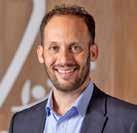
MESSAGE FROM THE PRINCIPAL
Recently there has been some welcome discussion in Australian media surrounding the adoption of enhanced educational approaches in school settings.
There has been coverage of the Melbourne Archdiocese Catholic Schools’ announcement that it has adopted a pedagogical framework that is grounded in explicit instruction. This follows on from a reported resurgence in support for a phonics-based reading model for equipping our early learners with foundational literacy skills.
At King David we adopt evidencebased pedagogical models that are anchored in an understanding of how children learn and develop. We utilise student data to adjust and enrich our practice and adopt different strategies that are suited for the age and stage of our students. We believe that deeply knowing our students allows us to tailor experiences which enable them to thrive. As Russell Kaplan, our Vice Principal Teaching and Learning, has stated, this enables us to construct opportunities in a way that our students’ brains “like to learn.”
The School’s curricular and pedagogical approach begins with an understanding that one needs a strong foundational basis in key knowledge and skills. This core is then utilised in various ways as a student grows older in a manner that deepens knowledge, enhances creativity and maintains engagement.
For this reason, both our early literacy and numeracy programs are anchored in a form of explicit instruction.
We directly explain the requisite skills, model them, offer students guidance as they practise them and then allow for opportunities to master these through independent application. Once our students have confidence in foundational skills, this allows for more creative exploration.
This exploration will be exercised in a developmentally appropriate manner that corresponds to what drives student motivation and enjoyment. For instance, across the key years of middleschooling, pairing moments of explicit instruction with opportunities for social and emotional learning and real-world application have been shown to hit the sweet spot which balances the acquisition of key skills and knowledge with engagement, curiosity and creativity.
Our current focus for staff professional learning is based on three key programs that support our students’ development. In the Junior School we are working on SOLAR (Science of Language and Reading) which focuses on the science behind attainment of reading fluency. We have found that the capacities of our students in literacy have advanced far more rapidly than before we were using the model. We are also using The Writing Revolution which is a program that explicitly teaches sentence structure, writing mode and the core skills to adapt writing for purpose and audience. I was so pleased to see the demonstration of this at our Year 4 level assembly earlier this term.
Our students confidently displayed their knowledge of
paragraphing structure and explained this with a level of detail that one would ordinarily expect from far older students.
At the Magid Campus, we are working with our staff on a pedagogical model called ‘Walkthrus’. This is a set of highimpact teaching strategies that have been collated by UK educator Tom Sherrington. This is a holistic program which focuses on the teaching skills that are most successful in a range of educational settings. Our Learning Area Leaders are working closely with staff to discuss and practise these key strategies and then to share feedback on their application. We believe that this will equip our teachers with the expertise to facilitate outstanding learning outcomes in a productive learning environment.
Our school’s founding Principal, Norman Rothman, frequently said that “a good school must never stand still.” This drive for innovation and improvement is the keystone of our approach to teaching and learning and our rich staff professional development offerings. We know that through a deep knowledge of our students and a commitment to adjustment, refinement and improvement of teaching practice, our school will continue to deliver outstanding educational outcomes.
 Marc Light Principal
Marc Light Principal
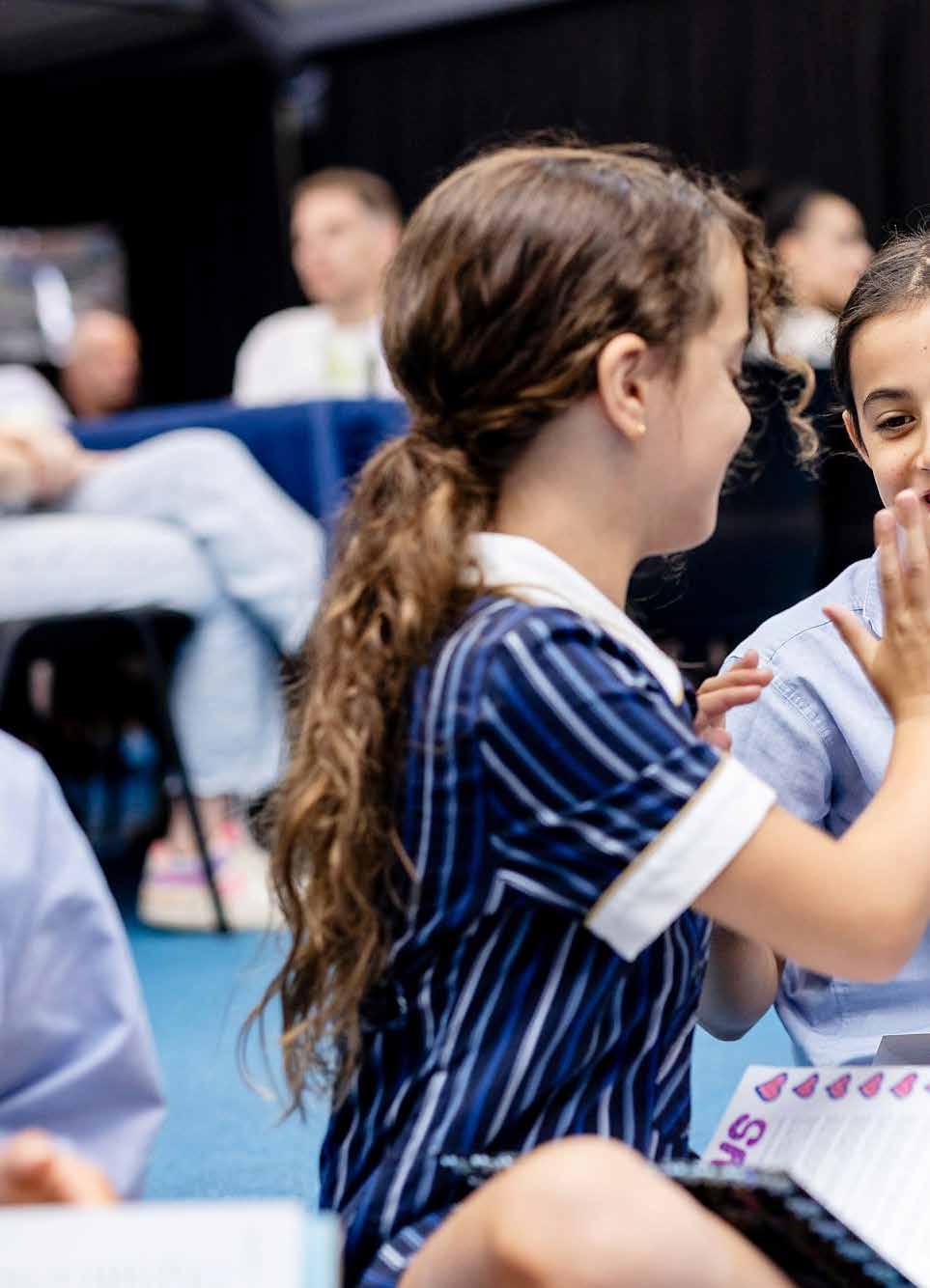
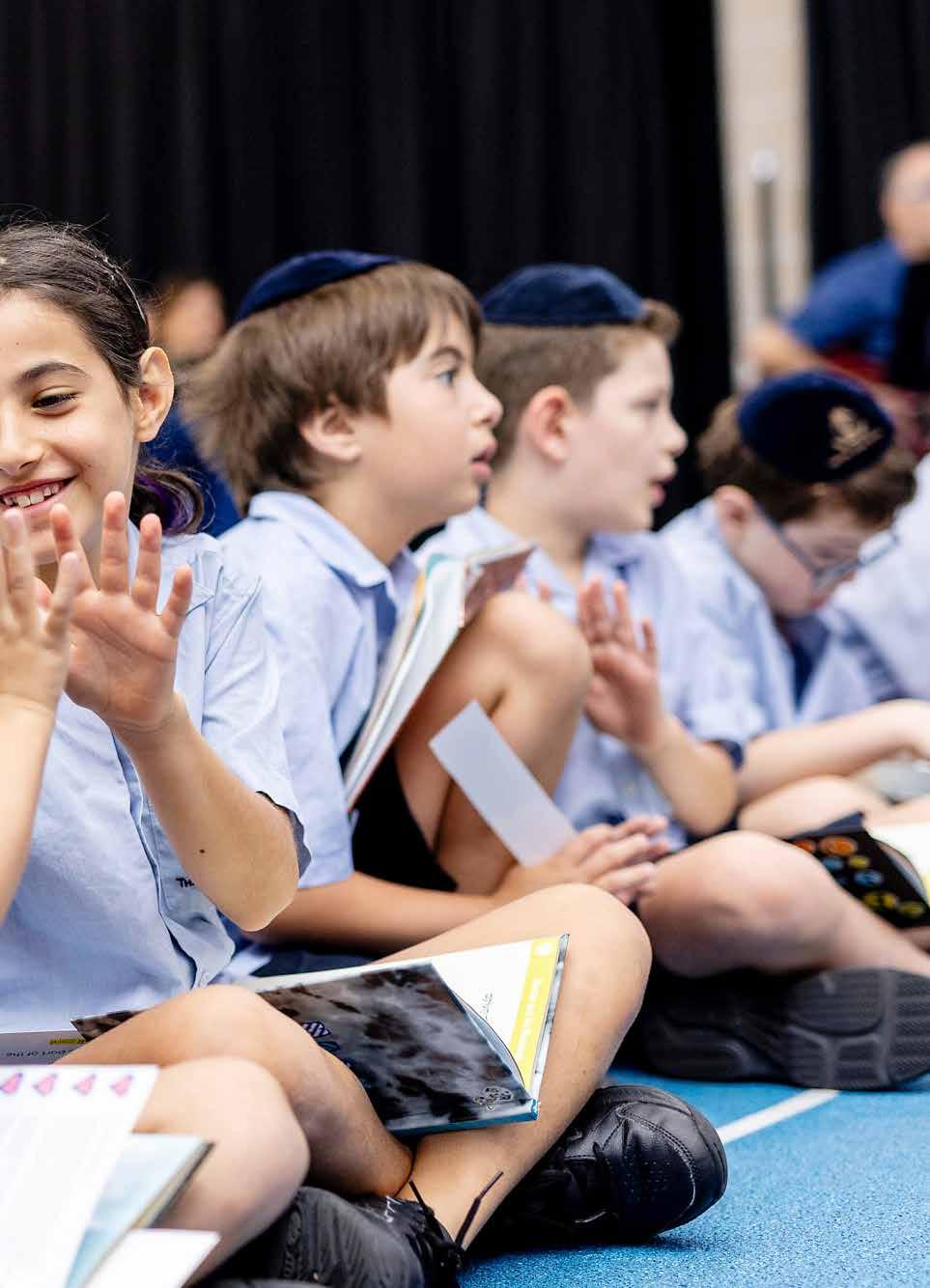
A STRONG START
Our Middle and Senior School students participated in a beautiful Back to School Service at the start of Term 1, run by our Jewish Life Va’ad (Year 12 student committee). This year’s theme was based on the lesson taken from the film Inside Out, which helps us to understand the importance of recognising and feeling our emotions without judgement. Students from each year shared something they are grateful for as part of Nissim b’Chol Yom (including friends, pets, and time at school). Principal Marc Light spoke of the ‘power of experiential education’ and it shone throughout the Service as students participated in song and
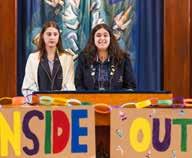

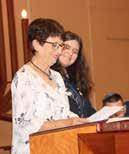
prayer, finding meaning in this new beginning. Va’ad Rosh Trixie Burstin-Irwin gave the drash on Parashat Mishpatim, emphasising the power of intention. Year 12 student Debbie Pastor spoke about her personal relationship to Judaism and the importance that the Progressive Youth Movement, Netzer, holds in her life.
We said a prayer for the release of the hostages, and of course, sang Oseh Shalom for peace.
Longstanding staff member Cathy Kaiserman was honoured with an aliyah l’Torah, as was our new Director of Jewish Life and Learning, Ilan Bloch. Year 12 student Milena Hain and her
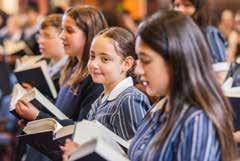
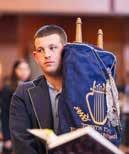
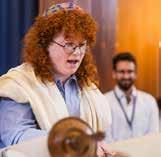

family were also honoured as Milena was called to Torah for the first time, becoming Bat Mitzvah. Kol HaKavod to our student leyners, Gemma Hatfield (Year 8), Reuben Goldfarb (Year 10) and Mia Bentata (Year 12) who leyned with resonance and clarity. Our Year 12 students were also given a special blessing on the bimah, as they attended their final Back to School Service. Mazal tov to everyone involved in this beautiful service.
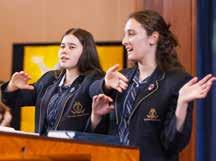
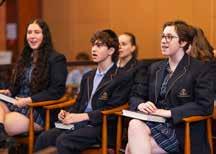
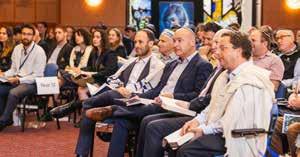
CONNECTIONS - KABBALAT SIDDUR
Our Year 3 students and families gathered for a meaningful and special Kabbalat Siddur ceremony in February. This was the first time the students officially received and used their Years 3-5 Siddur which they had previously taken home to decorate and personalise.
During T’filah, it was wonderful to witness the passing on of our traditions from generation to generation through the beauty of the brachot and songs. At the conclusion of T’filah, our students and families came together and explored how important the ideas in our Siddur are and how they connect us to our Jewish identity and the wider Jewish community.
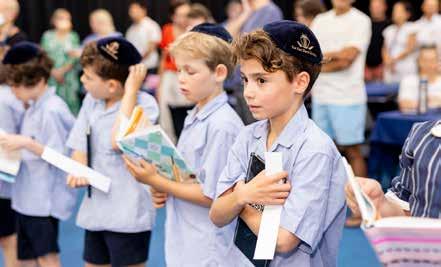
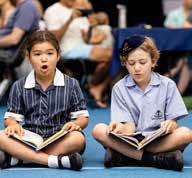
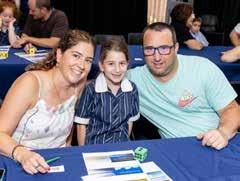

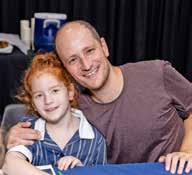
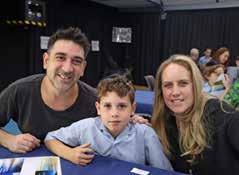
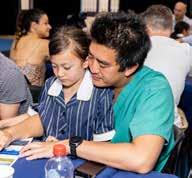
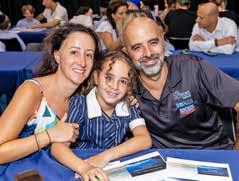
JEWISH LIFE AND LEARNING
Term 1 Jewish Life and Learning has been wonderful! The Hanhagah (student leaders) organized a meaningful Back to School Service along with wellattended optional weekly T’filah (prayer) during recess on Fridays. It is great to see the involvement of students at the weekly Prep to 2 T’filah with parents, and the Years 3 - 5 service. And, it is truly inspirational to see the entire Junior School come together for Rosh Chodesh (New Month) services, along with the monthly Am Yisrael Chai Club, and weekly Shabbat Club. It was really heartwarming to see our Year 3s continue on their Jewish journeys at the Kabbalat Siddur ceremony, where students received their new prayer books.
We celebrated Purim in style at both campuses, which included fancy dress parades, m’gillah (scroll of

Esther) readings, oznei haman (hamantaschen) making, competitions and exciting lunchtime activities. Year 10 students were impressive, leading programs and staffing stalls at the Junior School. The ELC and Junior School enjoyed an amazing fair and all students exchanged mishloach manot (gift packs) with their friends. We were privileged to support Impact for Women as our tikkun olam (repairing the world) project on the day.
In the lead up to Pesach, ELC and Junior School students participated in model s’darim and Years 6 - 10 students did a “deep dive” learning session during Jewish Studies classes on one of the key texts from the Haggadah. Year 11 students met with Rabbi Allison Conyer, Senior Rabbi of Temple Beth Israel, who spoke with them about the Pesach story and its contemporary relevance.

Other Middle and Senior school students explored Pesach further in their Jewish Experiential Education sessions.
During this term, we have also hosted numerous guest speakers across the Middle and Senior school. We eagerly look forward to another term of Jewish learning and living after the Pesach break!
Ilan
Bloch Directorof Jewish Life and Learning


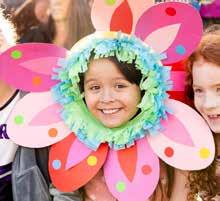
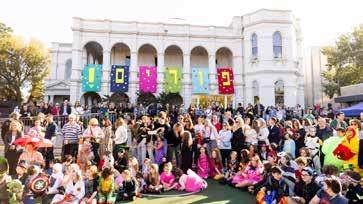
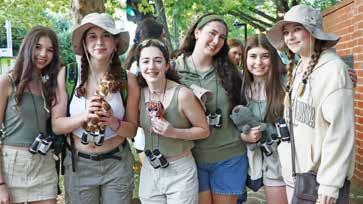
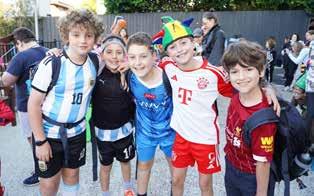
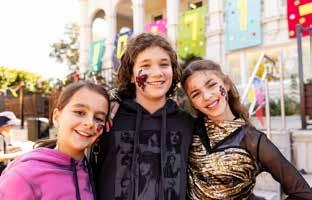

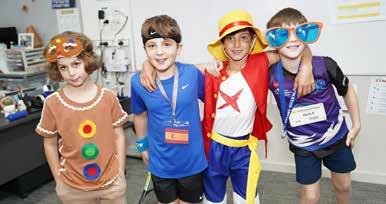


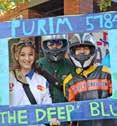
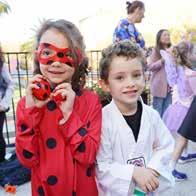

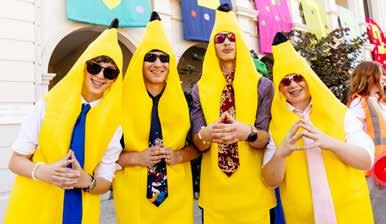
CONNECTING MEANINGFULLY WITH PESACH
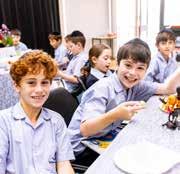
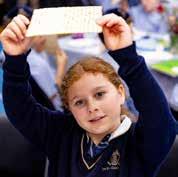
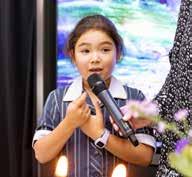
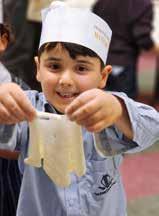
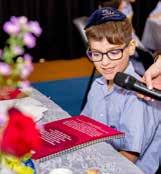
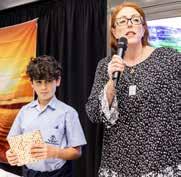
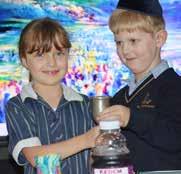
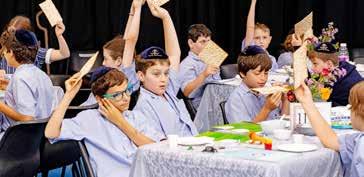
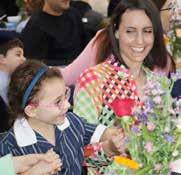
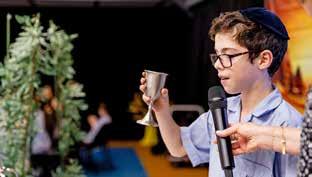

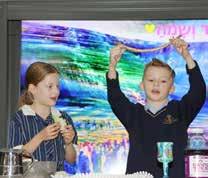
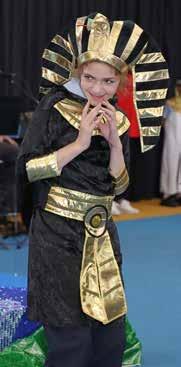
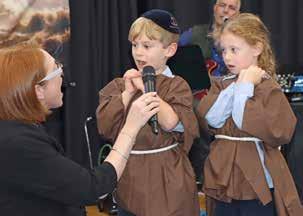
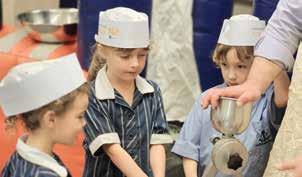
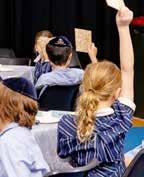


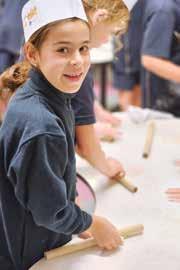
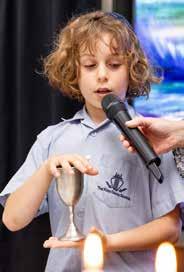

INNOVATING JUDAISM
Our Sages relate (Gittin 56b) that Yochanan Ben Zakkai asked the newly appointed Roman Emperor Vespasian to save Yavneh and its Sages, thereby spearheading a revolution in Jewish life, transforming Judaism from a Temple-centered religion, led by priests, who ruled by right of their lineage, into a portable religion, led by a meritocracy of Rabbis. As part of this innovation, he introduced several takanot (Rabbinic decrees), changing Jewish practice, which radically “reJew-venated” the lived experience of Jews forever more.
Years later, Judaism would innovate again, with the development of Reform, and other streams of Judaism in the nineteenth century. In 1801, Israel Jacobson would open the first Jewish day school in the spirit of what would become known as Reform Judaism. Of course, what we in Melbourne now call Progressive Judaism has evolved considerably since then. We never stop innovating.
Notwithstanding our innovations, we do not throw the baby out with the bathwater and still hold steadfast to our age-old tradition of הדות דומיל (Torah learning), together with its chavruta, or paired learning. It is perhaps our Talmudic tradition of discussion, debate and willingness to entertain a multiplicity of competing viewpoints and even truths which is one of the ideological underpinnings of the development of Israel’s high-tech industry.
This year we have experimented with an innovation in our Jewish Studies curriculum in Years 6-10, introducing a new lesson in the lead-up to some chagim, which involves exposure to traditional Jewish texts (with translation) and learning (including in chavruta) and reflection on some key questions which texts raise for us as individuals and as members of the Jewish people.
We recently analysed M’gillat Esther, with each year level doing a deep dive into parts of two chapters of the text, including learning Talmudic passages and parallel texts from the Bible. The Jewish bookshelf is the patrimony of the entire nation, regardless of affiliation to this stream or another.
If you would like to register to join our community of learners – of parents, grandparents and special friends of our school, please email me at ilan.bloch@kds.vic.edu.au and we can arrange our first study opportunity together.
Ilan Bloch Director of Jewish Life and LearningOUTDOOR EDUCATION
YEAR SIX CAMP
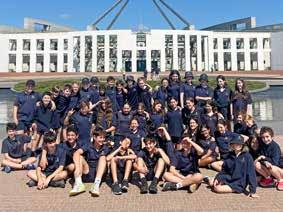
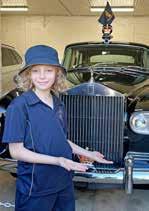
Wow, Year 6 camp was a blast. We made so many different memories and had heaps of fun. Our first day was filled with learning and lots of walking. The High Court and Governor’s House was very interesting. But the best bit that day was the Mint factory. I remember getting so excited just to buy a coin. We all loved the Mint shop especially because of all the coin necklaces. After filling up from the dinner of plant-based chicken we were ready for our night activity which was learning about the stars. Most of us were nearly falling asleep but that didn’t stop us from looking through a REAL telescope. That night there was an amazing moon eclipse.
The highlight of day two was Questacon. Which Russell and Mr. B described it to us as Scienceworks on steroids. Everyone in Year 6 hurried to the shop to buy putty, freeze dried lollies, slime making kits and more. After hustling into Questacon we went and explored. The best bits were riding the slide,
seeing caged lightning, going on the earthquake simulators and watching the big slab of rock making abstract drawings.
The Australian Institute of Sport (AIS) was one of our next trips. It was the last one of our activities for that day. The day included going to learn about voting and going to the old Parliament House. The AIS was very fun including the Sportex area with so many different simulators. Then we went on a tour and we saw the best gymnast in Australia!
The next day we went to the Australian War Memorial and Parliament House. There was a whole Parliament House made out of Lego with a zombie in it. We then departed for the House of Representatives and the Senate. Later we had fun pretending to be politicians by doing a role play activity. We ended off the night by going to iplay and playing laser tag, dodgem cars and arcade games.
Pearl Raphael - ZimmetYEAR SEVEN CAMP
Year 7 camp was probably the most enjoyable camp I have ever been on. To get to the campsite in Anglesea, we took a short bus ride before going on a hike to the campsite. Once we arrived at the campsite we got our cabins. The cabins were really nice with a shower that was quite a decent size and a bathroom that wasn’t too roomy but was nice and clean unlike the public toilets in your nearest shopping centre. Every morning in our classes we would go to one of three activities: surfing, boogie boarding or stand up paddle boarding. They were all super fun and though boogie boarding and surfing were somewhat similar, they all brought different things to do and try out. Stand up paddle boarding was at a nearby lake but both the surfing and the boogie boarding were at the beach.
Occasionally we would split into “family groups” for different activities. There were four groups and each of them had about fifteen people in it. It was fun that these groups were run by one of the Year 10 madrichim (leaders) who attended the camp. Instead of a teacher to student environment, it gave us more of a free and expressive environment where the rules were a little more relaxed.
The food at camp was delicious! Every morning there was always the option for cereal, toast and yoghurt with peaches. There was also a different hot food every morning such as eggs and
pancakes. Lunch would always be some form of carbs with salad and sometimes we could build our own sandwiches. Dinner was always amazing.
My favourite thing about camp were my cabin members. I have gained many friends due to being in a cabin with some new students. It was fun to hang out, say random things and potentially disobey orders to go to sleep!
All in all, camp was super fun and I enjoyed it so much. The activities were fun, the cabins were great and the food was awesome!
Nate Berhang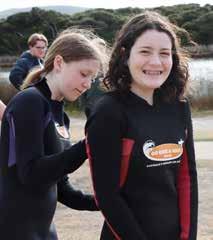
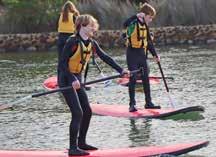
In the last week of March, we went on surf camp. I loved surf camp because it was near the shore and we got to spend a lot of time doing fun activities there. As soon as we arrived at Anglesea, we hiked for two hours to our camp which was pretty enjoyable because we got to hang out with all the Year 7s while looking at the beautiful views of the waves and surrounding trees.
Over the next few days, we also got plenty of time to hang out with our family groups. In every family group there were around fifteen students and one Year 10 student who came as a madrich. In our family groups, we had the opportunity to start new friendships. I liked that these groups were led by Year 10s because we had a smaller age gap making the school environment feel more like home.

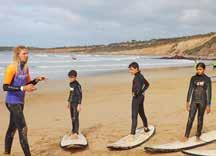
For the next three days, we were spending loads of time in the water. From boogie boarding to stand up paddle boarding and surfing, we all learnt new skills whether we have done any of these activities or not. After we started to get the hang of these activities, our activity turned from hard to easy and we started to grow smiles on our faces and we started to bond more with our peers.
Normally, we had breaks which included a lot of fun activities including competing against other family groups, meditation, group activities and watching movies.
I think that surf camp was not all about surfing. It was more about spending time with new people and sharing memories.
Mika Begelfor
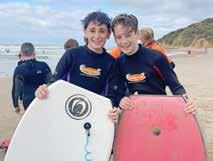
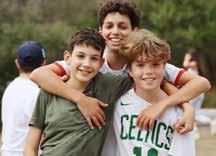
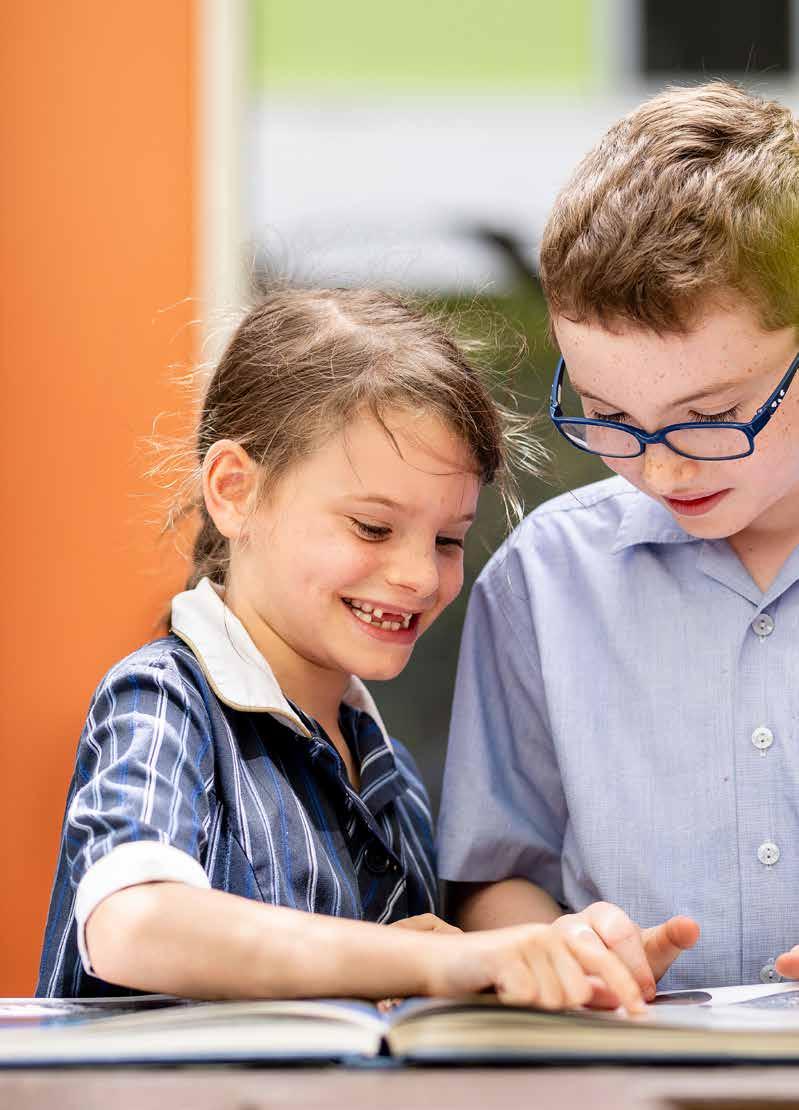
INNOVATING KING DAVID
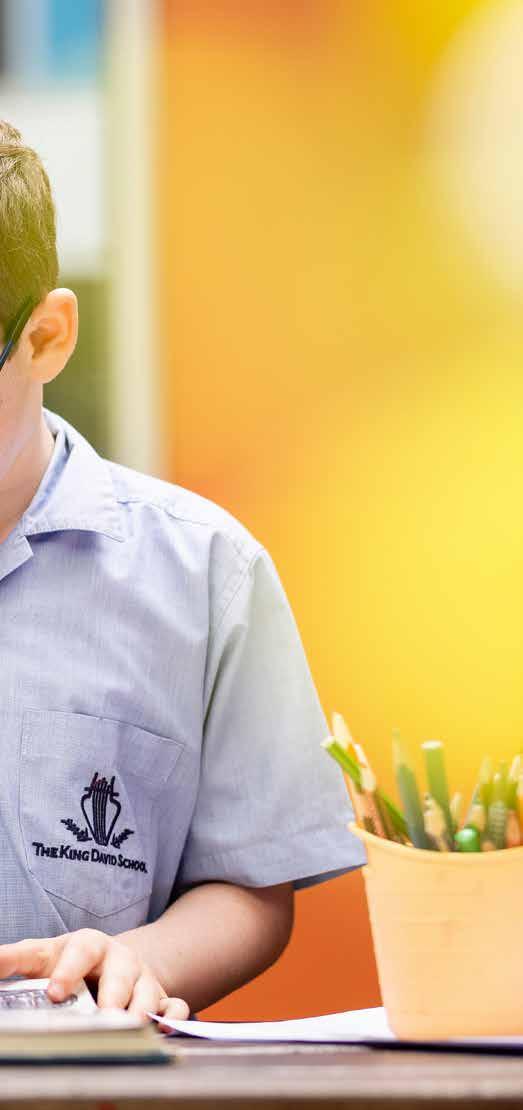
T he best educators, like all leaders, adapt to the changing information in front of them. This takes place on two levels: teachers are continually evaluating progress in the classroom and adjusting accordingly, and, as a field, education research is continually evaluating what works and what doesn’t. This means that teaching best practice is dynamic. We no longer expect students to learn rote passages from a textbook or listen to the teacher talk for an entire lesson without an accompanying task, let alone copy from the board!
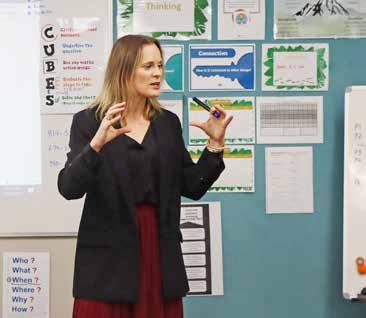
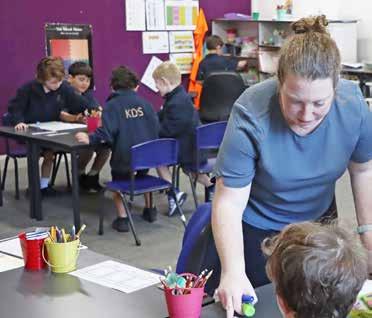
K“70 percent of kids will learn to read no matter how you teach reading but the 30 percent of kids who won’t learn, will learn this way.”
ing David has incorporated continual pedagogical innovation into its leadership structure. There is a Vice Principal Teaching and Learning whose role it is to ensure that teachers’ pedagogical approaches are in line with ever-evolving best practice. There is also a Coordinator of Innovation who works with teachers throughout the school to ensure their curricula align with current research on how students learn best.
Two particularly innovative programs in the Junior School illustrate KDS’s commitment to best practice: a literacy initiative, the ‘Science of Language and Reading’ and the writing program, ‘The Writing Revolution’. At our Magid Campus, staff are undertaking comprehensive training in ‘Walkthrus’, a systemic classroom development framework.
The ‘Science of Language and Reading’ is an evidence-based structured literacy program that teaches children how to read. The Grattan Institute recently released a report on the state of literacy at schools in Australia. It made sobering reading with its
view that over one third of school students nationally are not reading at proficient levels. The Grattan Institute attributed this failure to the rise in the ‘whole language’ approach to teaching literacy, which has been in vogue in Australia since the 1970s.
As opposed to the whole language approach which relies on students already possessing the word in their vocabulary, the structured literacy approach uses explicit instruction to teach phonological awareness. That is, it teaches children to hear and then read the 44 combinations of sounds in English. This allows children to decode words without necessarily having to know their meaning first. Vocabulary is developed through the rich texts that teachers use in the classroom, alongside explicit instruction and readers.
As Prep teacher and Science of Reading champion Rebecca (Beck) Fiala said, “70 percent of kids will learn to read no matter how you teach reading but the 30 percent of kids who won’t learn, will learn this way. If taught well and systematically, only two percent of students will genuinely struggle with literacy.”
ABOVE LEFT: Kaisu Tonkyra teaching the Writing Revolution to Year 4 students. ABOVE RIGHT: Rebecca Fiala teaching the Science of Language & Reading to Prep students.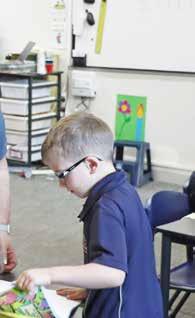
“Every day I get more excited and I find it more easy to read. I can put way more sounds together than at the beginning of the year.”
Prep-Year 2 students engage in the Science of Reading program every day. In Prep, for example, students use retrieval practice through a daily review, matching letters with sounds, blending them and putting the letter combinations into words. They also practise ‘segmenting’, writing down the sounds they hear, then the combination of the letters that make the sound. Preppies improve their speaking skills through an oral reading component each day.
Beck Fiala said, “Within two weeks we can already see students reading and writing words and even students that you wouldn’t expect to pick it up quickly are. Daily retrieval practice is neuroscience best practice.” The Program “gives students a sense of pride because they see results quickly which increases their confidence and they want to learn more.”
Prep student Julius Bieber embodies this pride, saying “Every day I get more excited and I find it more easy to read. I can put way more sounds together than at the beginning of the year.” Julius tells us that he loves reading at home as well as school.
‘The Writing Revolution’ program was trialled in Term 4 of last year. Like the Science of Language and Reading, it takes a stepby-step approach to teaching students how to build sentences, paragraphs and whole texts. Recent NAPLAN testing found that writing is an issue across the country. This program addresses this. Assistant Head of Junior School Janice Shearer explains, “it starts from sentence building blocks – ‘What is a fragment?’ and ‘What is a sentence? What’s a question? What’s a statement? What’s an exclamation?’” Junior School teachers have had 12 hours of intensive professional development training them in the Writing Revolution.
To ensure students have relevant and sustained content to write about, English is now combined with what used to be called ‘Units of Inquiry’, creating a double subject called ‘Integrated English’. Now as students learn their inquiry content, they utilise The Writing Revolution framework. Curriculum Specialist Junior School (and Year 4 teacher) Kaisu Tonkyra says this means there is “more time for deep learning in the unit content and at the same time we can teach deep writing skills.”
The Writing Revolution teaches students how to revise and edit their own work. It also aids reading and comprehension through asking them to summarise what they have read. Beck Fiala adds that as part of this program, students are “forced to think deeply. In their writing, they have to articulate a reason and a contrasting opinion. This changes the way students think as well.”
Year 4 student Joseph Welch says that the class has “learned how to use descriptive language and how to use it in our narratives to give the reader more information. For example, writing about a penguin, I would say ‘In a cascade of dew drops Peak the penguin lifted her head.’” Maddie Pryles, also in Year 4, adds that in Integrated English, “We worked on argumentative pieces. We also learned how to do ‘because, but, so’ and some subordinating conjunctions.” Joseph further explains that “a subordinating conjunction is something that combines the sentences: the school was white after the painters painted it.”
As well as how to build sentences into argument, students are taught note-taking techniques
(continued page 20)
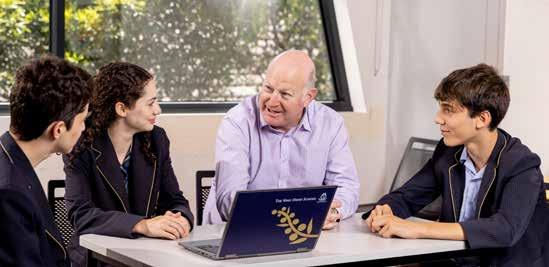
(continued from page 19)
and how to turn their notes into structured paragraphs.
Janice states that “These are skills students can take with them into Middle and Senior School.” It is not just students who are benefitting. Kaisu adds, “Teachers here are really inspired by what we’re doing and are actively sharing best practice with each other.”
This culture of sharing and supporting each other to grow is also present throughout the Magid Campus. Middle and Senior School teachers have undertaken professional development to incorporate structured teaching sequences called ‘Walkthrus’ into their classrooms. Walkthrus, like the Science of Language and Reading and The Writing Revolution, are based on current best practice. The program was developed by UK-based teacher and researcher Tom Sherrington and incorporates Rosenshine’s Principles of Learning.
Vice Principal of Teaching and Learning, Russell Kaplan, said, “When you look at the processes of learning, you can intervene in the learning processing at any time. What are the tools and strategies that teachers are using to do this and how do we know that they’re doing these interventions as effectively as
possible? Tom Sherrington’s program is designed to influence the learning process so it connects beautifully with our school’s focus on educational neuroscience.”
Teachers use one of the Walkthrus, ‘Establishing Expectations’ to systematically teach students the expectations of the classroom. The easier the brain can form a pattern, the faster it will be able to retrieve information. From a neuroscience perspective, systematically establishing expectations mimics the establishing of neural pathways which frees up the brain to concentrate on new content.
Another Walkthru that Magid Campus teachers are using is ‘Checking for Understanding’. This methodically gauges whether students have understood new content. It also involves students in each other’s learning, creating opportunities for students to expand each other’s understanding through summaries of the topic at hand. This provides on-the-spot evidence to the teacher regarding the need for clarification or expansion.
Visual Arts Learning Area Leader Jade Karp said that the Walkthrus “encourage every educator not just to reflect on

big pedagogical ideas, but to simultaneously apply these ideas to the teaching taking place within their own classrooms on a granular level.” Magid Campus staff now meet regularly in their learning areas and as a whole cohort to share their experiences utilising Walkthrus in their classes.
In addition to advancing classroom practice, teachers are supported to innovate curriculum. Innovation Coordinator, Adi Zayon, works with teachers to help their curriculum include more creativity and choice. Adi said, “We want to create life-long learners and to do that we have to make learning interesting and make it something that students want to do, that excites them. If there’s room for choice, for variety, then that can often lead to a passion for learning.” Adi is a big proponent of Projectbased learning, which allows for deeper student-led work. One example of this is Year 7’s Future Cities project whereby teams of students design and produce a prototype of a sustainable city for their future needs which they showcase in an exhibition.
Project-based learning is built into all levels of the Middle School. Year 9 student Ben Aghion reflects, “With projectbased learning, I learn much more, and much faster.
ABOVE LEFT: Vice Principal Teaching & Learning, Russell Kaplan, with students. ABOVE RIGHT: Innovation Coordinator, Adi Zayon, with students presenting their future city.

EDUCATIONAL INNOVATION WITH IMPACT
“Innovation is progress in the face of tradition.”
Divad Sanders
If you talk to most organisations about what they are striving for, you would not be surprised to hear the words “a competitive edge” in their particular market. When looking a little deeper at this statement, it appears that most organisations want to be “unique” or “different” from their competitors and one of the most recognised ways to achieve this outcome is through being innovative.
“Teachers here are really inspired by what we’re doing and are actively sharing best practice with each other.”
I’m more engaged and I much prefer it to regular learning in a classroom.”
Year 9 student Kiara Nathan adds that “I found Passion 4 Thinking (the Mars colonisation task) last year very informative and fun.”
Adi sees a strong link between innovation and creativity. “You have to have a creative mindset in order to be able to innovate. So much of what we want to teach our students is critical thinking and problem solving, and those thinking skills are essential for creativity. To be able to be flexible in your thinking, to try things, to be willing to fail and all that. Innovators need to be problem solvers, creative thinkers. These are skills we want our students to have and the skills our teachers can model in our classrooms.”
In every classroom at King David, our teachers are innovating to create innovators.
At King David we view “academic innovation” slightly differently. We are not trying to be unique or different from what already happens at other schools, but rather a pioneer and leader in the area of education. We accomplish this in three distinct ways:
1. We focus on having a deep understanding of how children’s brains learn and develop, both within and outside of the classroom;
2. We provide professional development for our teachers that is entrenched in the latest research of how children learn and how they like to learn;
3. We create safe and meaningful experiences for children to naturally learn, question and develop.
Academic innovation at King David therefore, is about challenging ourselves as educational leaders to experiment with new practices and theories on how children learn and like to learn, through the adaption and development of our teachers’ craft and pedagogy, while ensuring that this is achieved through a safe, caring and nurturing environment.
King David applies this understanding to all Learning Areas of the School by our teachers being involved in continuous evidencebased professional development in the area of The Science of Learning (‘Walkthrus’).
Teacher Walkthrus clearly identify a set of evidence - based strategies or skills that teachers can use to directly impact the learning process of children, while all the while being delivered in a safe and nurturing environment.
This is why King David is at the forefront of providing exceptional innovative academic education. By introducing innovative approaches in education that directly impact student learning and improvement, through the development of teacher practice, we are ensuring that our students and teachers continue to be life-long learners.
Russell Kaplan Vice Principal Teaching & LearningELC AND JUNIOR SCHOOL
FROGS, AVADIM AND PHARAOHS
At our Early Learning Centre, the children were clearly very ready to participate in their family Pesach Seders having showcased their Jewish learning to their adoring families during model s’darim, held at the end of term, replete with songs, frogs, avadim (slaves) and pharaohs.
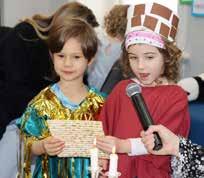
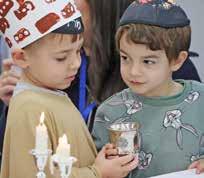

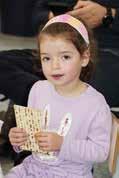

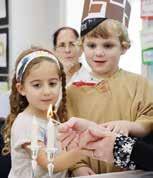
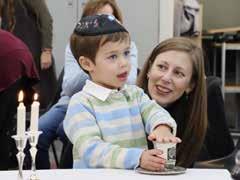
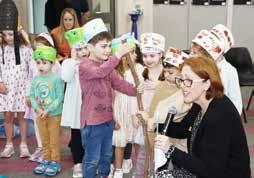

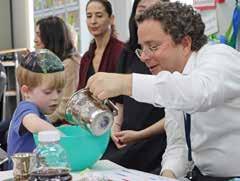
STARTING PREP
It was a BIG day for our littlest Junior School students, starting Prep as an orientation, one day ahead of the official start of the new school year.
The Preppies arrived in their neat and crisp uniforms and oversized bags and appeared less nervous than their parents! They engaged in an activity identifying brain food from a list of foods, listened to the classic Mem Fox story Where is the Green Sheep? read by Beck and then decorated their name labels for their tub. After a play outside it was already time to head home and prepare for their next big day!
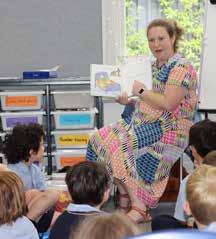
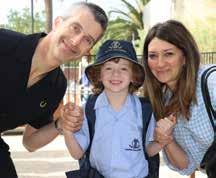
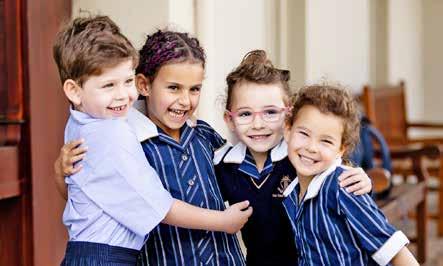
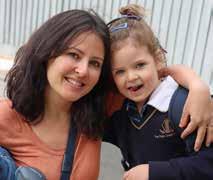
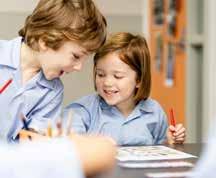
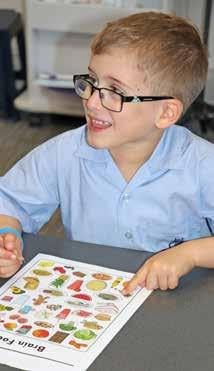
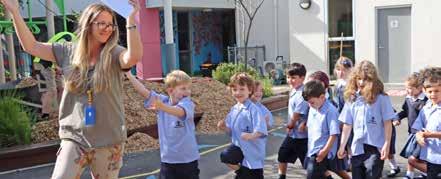
MIDDLE SCHOOL
LIFTING OFF WITH LAUNCH EXPERIENCE
Our Years 6 - 8 students started the school year with Launch Experience, jam packed with fun activities that foster team work, organisation and help each year level get to know each other better.
Students walked the 1000 Steps (Kokoda Track), engaged in a Scavenger Hunt, joined the Young Scientist program, learned positive communication and organisation skills, made music together, participated in a Murder Mystery, played with giant bubbles, successfully decoded an Escape Room, and more.
Together, students launched into a magnificent year of learning in the Middle School.
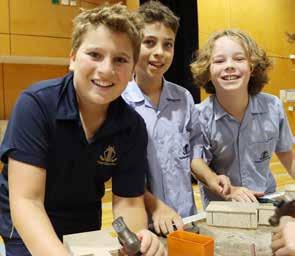
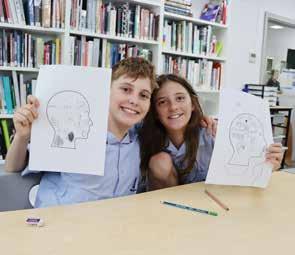
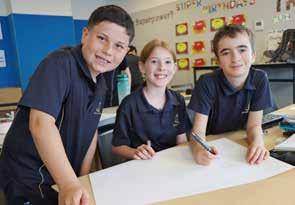


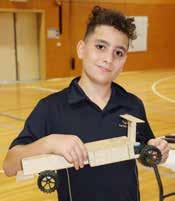
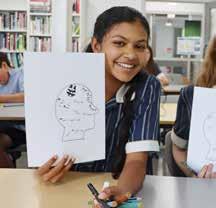
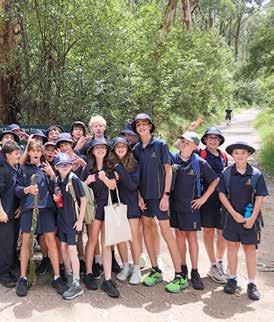

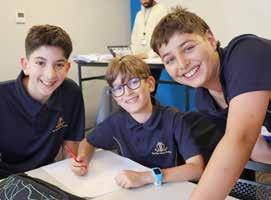

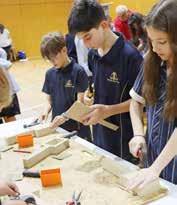

WINNOVATION AND SOCIAL MEDIA
e live in a world where innovation is seen as generally good. Innovations are here to make our lives easier, to remove the mundane tasks and allow us to spend time on more important tasks. For most innovations, this is true. However, some innovations may not be as good as you think.
Social Media, in my opinion, has created inestimable harm for adolescents and the unchecked tide of Social Media is producing a much damaged generation. I want to state clearly that I am no Luddite and embrace technology, but now is the time to call out the evils of the innovation of Social Media.
In case there is any confusion, Social Media is any platform which allows people to interact in an unfiltered manner. “Social Media” may include social networking sites (e.g., WhatsApp, Instagram, Snapchat, Facebook, TikTok), text messaging and messaging apps, social gaming tools, YouTube, and more.
Human beings are social animals, we are driven to interact with each other. Social Media provides a vehicle for this. The problem arises from the fact that Social Media means that we have no time when we are not socialising. Time to reflect, decide, consider, calm down.
I thankfully grew up in a time with no Social Media. I went to school, had a myriad of interactions throughout the day, both positive and negative. In 24 hours, I only interacted with my friends for seven hours.
Adolescents today have no social downtime. They are in a series of perpetual interactions, which occur in milliseconds. Leaving them no opportunity to reflect, decide, consider or calm down.
The many hours that adolescents spend on Social Media must have a major psychological effect. It is simply impossible for any human being to spend so many hours on Social Media and it have no impact. Research has shown that it is already changing the structure of the brain itself.
It is no surprise that anxiety, self-harm, suicidal ideation and eating disorders continue to increase among kids and at a younger and younger age.
Beyond the very negative psychological impact users are exposed to here is also content of very questionable accuracy, including conspiracy theories, clickbait, hyper-partisan content, pseudo-science and fabricated “fake news” reports.
To bring this all together; Social Media is having a devastating impact on the psychological wellbeing of our children, it is putting our children at risk and society is watching this happen.
Parents must be in constant conversation with their children about Social Media
• Parents must curtail Social Media use with every means possible –limit Wi-Fi, demand that devices are not in bedrooms, impose device free times;
• Parents should not be bullied into getting their child a phone;
• Offer children a better alternative – most kids will get off a device to do something else.
This battle is worth fighting – parents may not believe they can control Social Media but maybe we have given up before we start.
David Opat Vice Principal Wellbeing and Head of Junior SchoolPERFORMING ARTS
‘13’ - A COMING OF AGE TALE
It has been a privilege and pleasure working with our very talented cast and crew to bring the Senior Musical ‘13’ to the stage. This production is particularly relevant to our community given recent world events. I felt that it was important for us to choose a production that offers our students and community the opportunity to connect with and celebrate our culture.
‘13’ focusses on Evan Goldman’s journey to becoming a “man”. In order to achieve this, Evan has to grapple with his Jewish identity and values. I wanted to present this idea visually, so the set design is made up of 12 triangular shaped pods that come together to form a giant ‘Star of David’ during the scenes that reference
Evan’s Bar Mitzvah. To create this motif, our entire cast and crew had to work together to form this central symbol. In many ways I see this mirroring the way our teaching community works together to help form and shape our students’ understanding of their Jewish culture.
It has been so rewarding to see how our cast and crew have developed skills in leadership, teamwork, focus, commitment, respect and resilience. Thank you to the entire cast and crew for your amazing efforts. A special mention of our KDS alumni, Charli Cantoni-Bud and Teige Cordiner (Class of 2023), who have assisted with this production. Their planning and skills have helped to ensure the success of ‘13’.
I would also like to thank all of our Year 12 students involved in this production –Sage Aghion, Jaida Cohen, Tash Freiberg, Zoe Munz, Debbie Pastor, Luci Vidal and Shelley Wajsbrem. Despite their busy schedules, they have displayed outstanding commitment to their roles.
This production would not have been possible without this school’s incredible support of the Performing Arts. At KDS, an understanding of the educational and life skills benefits of the Performing Arts is woven into the fabric of the School and its ethos.
Eli Erez Head of Performing Arts and Productions
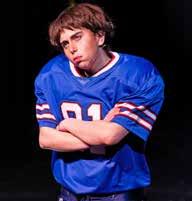
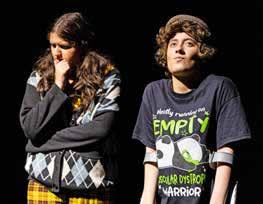

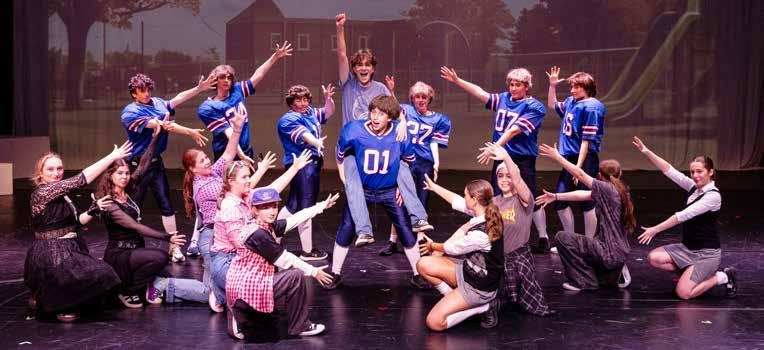
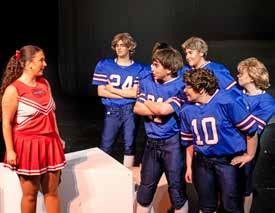
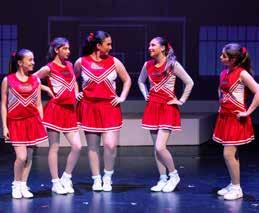
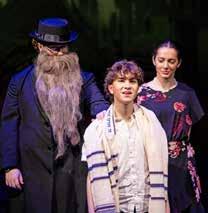
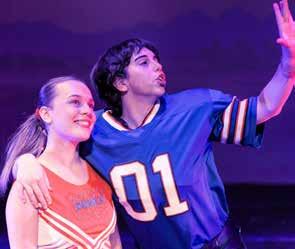
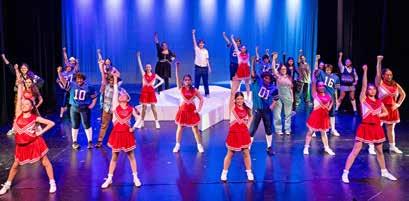
SPORT
INTER-HOUSE AND INTER-SCHOOL COMPETITION
Negev emerged victorious at the annual Inter-House Swimming Gala, showcasing exceptional House spirit and teamwork. It was great to see so many students completing the 25m races, 50m races and the novelty events. Well done to Year 6 and Year 12 who had the highest level of participation in the water!
The Ruach competition featured captivating dance routines, adding to the excitement of the day.
The inaugural Maccabi Cup was held for Years 5 and 6 students, which showcased the amazing basketball talents of our students.
The girls’ team played hard and displayed determination and grit against the other schools.
The boys were extremely strong competitors and placed second overall, narrowly missing out on first place after a three way tie.
Years 5 and 6 students competed in the Balaclava Round Robin in many sports including basketball, softball, hockey, volleystar, cricket. The teams were coached by our sports teachers and coaches and they all did extremely well.
Senior students participated in EISM soccer, table tennis, basketball, tennis and gym. The Senior Tennis team won all rounds during the summer competition and made it to the grand final where they played against a top opposition side and were runners up.
Chelsea Dabner Sport/PE Learning Area Leader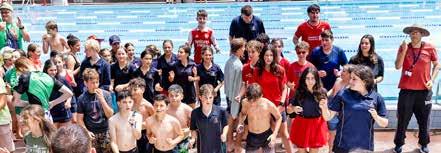
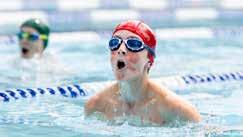
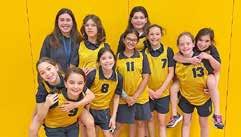

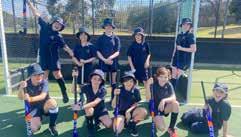
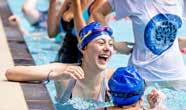
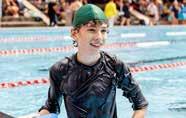
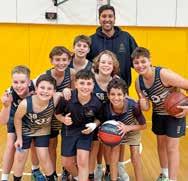

TEACHER PROFILES
Our excellent teachers are the backbone of our school. Each Inspirations we highlight two of our educators, getting to know more about them. This issue, we feature Junior School teacher Taryn Stark and Middle and Senior School Science Learning Area Leader, Dipesh Vadher.
 Taryn Stark, Jnr School Teacher
Taryn Stark, Jnr School Teacher
Q: Why did you become a teacher?
I became a teacher because my father, who is a lawyer, warned me against doing law, which was my original goal in Year 11 and Year 12. I remembered the enjoyment I gained when I taught my sister to write the letter ‘a’ when we were little and when I really thought about it, I knew that teaching was the right path for me.
Q: When did you start at King David? I started in 2009.
Q: What is your favourite part of teaching? Sharing my love of reading with my students. Talking about my favourite books from when I was a kid and opening their worlds to different genres and authors is a privilege. At the end of last year, I had a student who is now in Year 11 but who I taught in Year 4 tell me that because of my love of reading, she is now a voracious reader and she can pinpoint the start of it to that year in my classroom.
Q: What drew you to primary education?
Every day is different. Every group of children is different. You are challenged in ways that I don’t think exist in other settings. You can see your impact clearly and know that what you say and what you do each day in your classroom can make a huge difference in the life of each child that you teach. Plus, I’m not sure I am cut out for sitting in front of a computer screen all day!
Q: What do you like about teaching at King David? The community. KDS is a really special environment for families and I think a lot of places try to create that feel, but at KDS, it just occurs organically. The teaching staff are pretty extraordinary too. Some have been here as long as I have and others have only been here for a couple of years, but it doesn’t make any difference to the way our community, especially at the Junior School, supports each other.
Q: What are your hobbies outside of school? Well, if it wasn’t obvious, I am a voracious readerbooks, magazines, newspapers... anything! I love long walks by the water, watching movies and going to concerts and gigs.
Q: What’s something that might surprise us about you?
During university I worked on weekends for a party company. Every weekend I would host children’s parties dressed as a pirate or a superhero and if needed, could face paint and make balloon animals. I absolutely loved it and it taught me about behaviour management and holding the attention of children for long periods of time.
 Dipesh Vadher, Science Learning Area Leader
Dipesh Vadher, Science Learning Area Leader
Q: Why did you become a teacher? I’ve always had the idea of ‘Seva’ –the Hindu and Buddhist concept of service – in mind. I’ve always tapped into this and wanted to help people. That journey lead me to thinking teaching would be the best way to help others and the community around me.
Q: When did you start at King David?
I’ve been at King David since 2020.
Q: What is your favourite part of teaching?
When I’m sitting with students and we’re working through problems together.
Q: What drew you to chemistry?
The cognitive demand of chemistry is different from other subjects and feeds into what I get the most joy out of, which is problem solving.
Q: How do you use innovation in your teaching? For a long time I’ve been working on looking at how we can use all of the data that we gather in our school setting and use it to inform practice – anything from classroom teaching to whole school resourcing. At King David we’re now taking standardised testing data as well as school-based assessment to look at where students currently are and where they potentially could be. In real time teachers can look for where intervention is necessary to promote growth in students.
Q: What do you like about teaching at King David? I like that it’s a real community. The students in a vertical way all know each other and there is a real community bond between students. This is also between staff – as soon as I started I felt part of the King David community.
Q: What has been a surprise about King David? The openness for innovation. I’ve always worked in school settings where everyone talks about innovation but when it comes to being innovative, nothing happens. Whereas here there’s a real openness to actually move in that direction and innovate.
Q: What are your hobbies outside of school? Music, reading, cooking, spending lots of time with my family.
Q: What’s something that might surprise us about you?
I’ve been working with Dr Shayam Bar, an expert in the field of self-regulated learning and I’m featuring in his upcoming book offering some strategies around feedback.
“Generative AI is potentially as transformational for businesses as it is for everyday people” (The Australian Business Review).







This year’s Business Lunch will cover the hot topic: The Revolution is here: Business in an AI driven world.
We have an exceptional panel who will provide expertise and insights into generative artificial intelligence and its impact.
Atlassian co-founder Scott Farquhar in a recent interview stated: “Generative AI is potentially as transformational for businesses as it is for everyday people” (The Australian Business Review).
Already it’s being reported that a gap is beginning to emerge between those companies who remain circumspect about the prospect of AI, and those forging ahead using AI within their business. Some predict industrywide disruption that many businesses won’t survive.
This event will give you a prime opportunity to hear from leading speakers on the benefits and opportunities, challenges and risks, and importantly, ethics and regulation around AI.
Tables are selling fast. For further information or to book your table of 10 email: foundation@kds.vic.edu.au or scan

SHAPING OUR FUTURE: EMPOWERING TOMORROW’S LEADERS THROUGH EDUCATION AND SOLIDARITY
“As we navigate through these challenging times, let us stand together in solidarity to ensure a brighter future for our children and our community.”
As a member of The King David School community, you understand the importance of providing our children with a strong foundation embedded in Jewish values and education. Even more so today amidst the concerning rise in antisemitism in our community.
At King David, we are dedicated to nurturing the next generation of Jewish leaders who will proudly carry forward our traditions and values. However, we cannot accomplish this mission alone. We rely on the support of generous donors in our community to ensure that every child, regardless of financial circumstances, has the opportunity to receive a quality Jewish education at King David.
Donations made to the King David Foundation make it possible for the School to offer vital fee assistance scholarships to families in need, allowing their children to access the transformative experience of a King David education.
We pride ourselves on instilling in our students a deep sense of pride in their heritage, equipping them with the knowledge and resilience to combat antisemitism and adversity with strength and conviction.
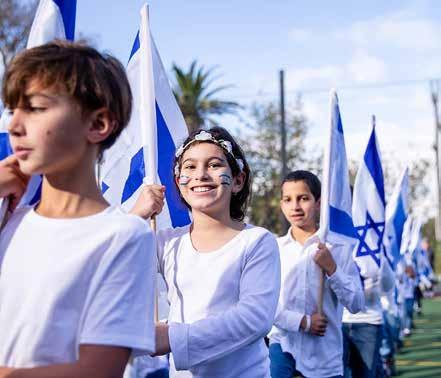
As we navigate through these challenging times, let us stand together in solidarity to ensure a brighter future for our children and our community.
Your donation, no matter the size, will make a difference in the lives of our students and the future of our community.
We hope that the entire King David School community will
come together to support our Giving Day on Wednesday 19 June for the Annual Giving Appeal. Look out for our social media posts and other promotions as we get closer to the Giving Day. The Giving Day platform will be live from 16 May: www.charidy.com/kds
WHAT A FUN DAY!
Our inaugural KDSPA Fun Day held at Caulfield Park Bowling Club in March was filled with family, fun, friends and fantastic activities. Thanks to all who came along and contributed to its success.
A special thanks to our KDSPA team who organised the event and our Year 12 students for assisting with the activities. We’re already looking forward to next year’s Fun Day!
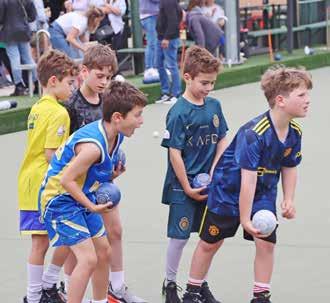
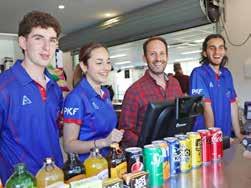
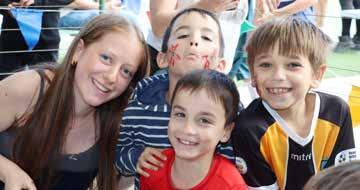
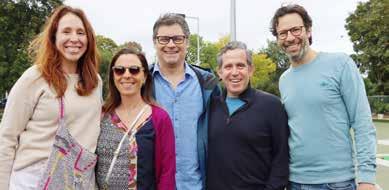
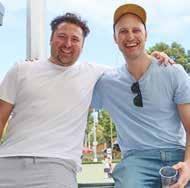
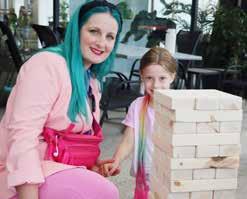
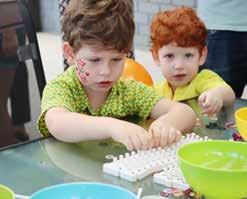


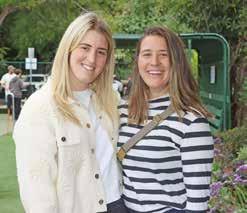
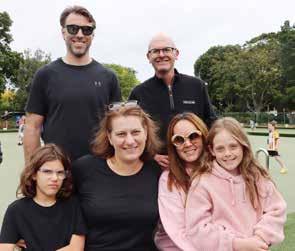
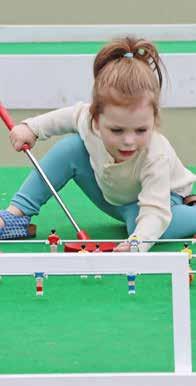
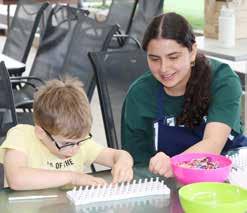
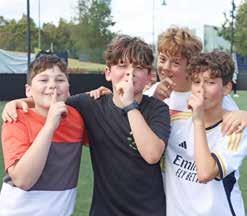
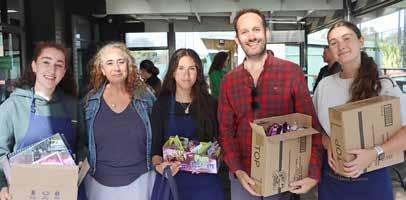
Welcoming our Youngest Students
It was a beautiful sunny morning for our annual Welcome to ELC picnic hosted by the KDSPA. It was wonderful to see so many new and returning families experiencing our warm KDS community. In particular, it was special to welcome second generation KDS students as even more KDS alumni return to us - now as KDS parents! We look forward to sharing many more occasions with our ELC families as these children grow up together through their time at our School.
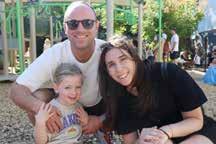


Building Community
Year 7 parents came together for a social evening hosted by the Parents’ Association. The perfect night out while their children were enjoying time at surf camp in Anglesea! It was a great opportunity to welcome so many new families who have joined KDS for the first time. Parents enjoyed viewing a sneak peak of photos and hearing highlights from camp.
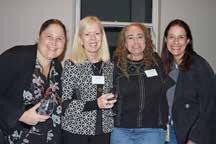
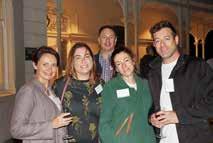
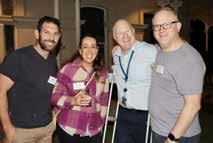
Green and Gold Trivia
A fabulous end to Term 1 as the RMC Hall was filled with parents decked out in their best Aussie gear to test their knowledge of all things Australia at the KDSPA Trivia Night. Hosted by Russell Kaplan and Raoul Salter OAM and coordinated by Sarah Popper, participants were treated to a hilariously entertaining evening. A fun way to socialise and also fundraise for KDSPA at the same time.
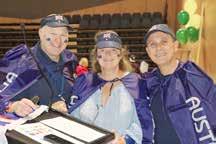
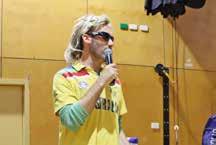
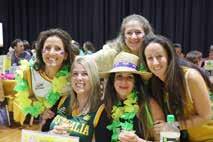
ALUMNI
WHERE ARE THEY NOW?
Choosing your Path Beyond School
Thinking about life after school and all the options available can be overwhelming. Each year our Year 10 students participate in Pathways Day to start the process of understanding the different career pathways as well as completing the Morrisby Test to assist them with finding careers that match their interests and passions. Each student also has the opportunity to meet one-onone with KDS Pathways Advisor, Nicki Goodrich.
A popular session at the Year 10 Pathways Day is the alumni panel. This year we invited recent graduates who are at university to speak with students about how they chose their university courses, and how they have found the university experience so far.
It was wonderful to celebrate the diverse pathways that our alumni have taken since leaving KDS. The students enjoyed hearing about balancing university and working life and the opportunity to change courses along the way.
Jeremy Bendel (2021) started at Deakin University full time straight after school and is undertaking a double degree in Real Estate and Commerce and also working in Real Estate as a commercial leasing agent.
Raphael Bush (2022) told students about life studying Medicine at Monash University.
Layla Light (2020) took a gap year and participated in the Habo Shnat program in Israel before returning to start a degree in Architecture. Layla also spent time in Perth at Curtin University within the Interior Architecture department. She has now transferred to a Bachelor of Design (specialising in Spatial Design) at Monash University.
Sabina Polkinghorne-Katz (2020) undertook some travel after school and also commenced a Bachelor of Physiotherapy (Honours) at Monash University.
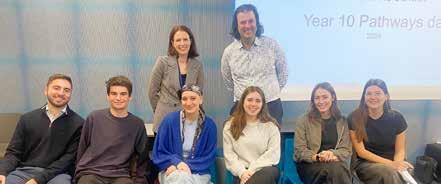
Yoni Ringelblum (2022) is undertaking a Bachelor of Nursing and Bachelor of Midwifery at Deakin University. She has also continued to volunteer as a Helfer (leader) at SKIF and has started working at Sholem Aleichem College and as a coach at Maccabi Netball Club.
Amira Susskind (2020) explained how she completed the first year of a Bachelor of Creative Writing at RMIT and has now transferred to a Bachelor of Fine Arts in Acting at the Victorian College of the Arts.
Class of 2023 University Placements
Our 2023 VCE results puts KDS in the top 2.5% of the state. 98% of the Class of 2023 were offered a place in their preferred course. We love seeing our students follow their passions. Some students have commenced the first year of their tertiary studies and others are taking a gap year. We look forward to hearing about these many and varied experiences!
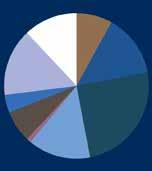
ALUMNI NEWS
Please continue to keep us informed by sending your news or changes to your contact details to: alumni@kds.vic.edu.au
ENGAGEMENTS
Batel Bareket (2017) & Nathan Kokes
Jeremy Basser (2011) & Kate Phillips
Jonathan Blashki (1999) & Jacquline Rakov
Tia Blum (2016) & Josh Shatter
Rachel Cashmore (2010) & Scarlett Abramson
Josh Daniels (2013) & Ashleigh Klooger
Melanie Horin (2006) & Stuart Agnew
Michael Kahan (2010) & Kayleigh Flaks
Dana Krasky (2013) & Harrison Smith
Sara Kogan - Lazarus (2012) & Ron Beliavski (2012)
Rebecca Maher (2014) & Jake Goldberg
Ellie Zarfaty (2010) & Yoni Cukierman
MARRIED
Lauren Basser (2009) & Joonmo Ai
Nathan Companez (2009) & Tamsin Gordon
Ike Curtis (2013) & Natalie Hayman
Sarah Fink (2013) & Jake Lew
Sophie Fink (2014) & Mitchel Tuul
Jesse Finkelstein (2010) & Jess Gorbonos
Yoav Fisher (2013) & Jessica Horovitz
Nicole Gerson (2014) & Jake Port
Dean Goldstein (2012) & Andrea Lipshutz
Tamar Green (2009) & Ryan Henry
Joel Hamilton (2010) & Bianca Saltzman
Emily Hunt (2012) & Dave William
Aviva Meisner (2010) & Justin Joffe
Jessica Rogers (2009) & Sam Griffin
Naomi Rubenstein (2014) & David Cohen
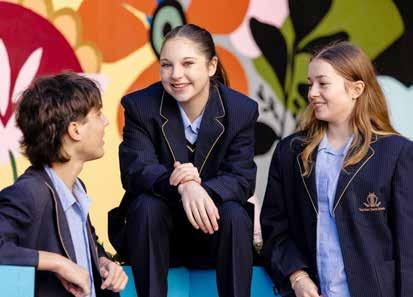
BIRTHS
Jessica Chakman (1997) & Gustavo Avelino
Tessa
Max Eichenbaum (2006) & Sara Tan
Chun Li
Gabi Joffe (2010) & Guy Silbert
Harper
Jamie Hymans (First) (2009) & Jason Hymans
Mckenzie
Liana Kiriati (2011) & Samuel Blashki
Matilda
Bryan Ladowsky (2010) & Rebecca Abelman
Violet
Liat Nikolayevsky (Goffman) (2006) & Artem Nikolayevsky
Isaac
Gabbi Sheiman (Grayman) (2011) & Daniel Sheiman (2011)
Celeste
Ethan Steen (1993) & Romy Grace
Julien
Alumni Reunions
Sunday 26 May, 6:30pm - 8:30pm
Class of 2004 (20 year reunion)
Class of 2014 (10 year reunion)
Class of 2019 (5 year reunion)
For further information email: alumni@kds.vic.edu.au

ELC & Junior School Tour (Pre-Kindergarten-Year 5)
Monday 20 May 2024
Middle School & Senior School Tour (Years 6-12) Friday 26 July 2024
Book online: www.kds.vic.edu.au
Enquiries: 03 9527 0102
